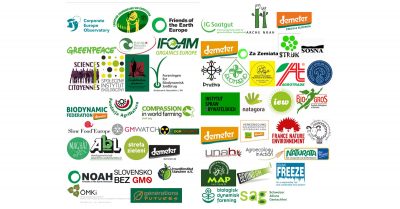Groups Slam Commission Plans to Deregulate New GMOs
Commission reportedly aims to exempt some new GMOs from safety regulations within four years and change regulation for all new GMOs within 10 years

All Global Research articles can be read in 51 languages by activating the “Translate Website” drop down menu on the top banner of our home page (Desktop version).
Visit and follow us on Instagram at @crg_globalresearch.
***
In April this year the European Commission’s health division DG SANTE published a “working document” in which it announced that the EU’s GMO regulations are “not fit for purpose”. The Commission made suggestions that could lead to crop plants produced using experimental new GM techniques such as gene editing being exempted from the requirements of the regulation. This could mean that these crop plants would not be subjected to safety checks, GMO labelling, or traceability and monitoring requirements.
Now 57 groups, consisting of non-governmental organisations (NGOs), a peasant farmer organisation, and business and trade associations, have sent a response to the Commission,[1] strongly opposing its plans on the grounds that “deregulation of new GM techniques would pose unacceptable risks to human and animal health and the environment. Deregulation would also prohibit citizens from knowing what they are eating and farmers from knowing what they are sowing.”
The groups, 51 of which are EU-based and six in non-EU countries within the European continent, add, “The Commission’s proposals cross red lines regarding biosafety, transparency of information, and consumer protection. They should be rejected.”
The groups’ response lays out several objections to the Commission’s plans, including:
- The consultation process that led to the Commission’s document was biased from the outset, with the vast majority of inputs (74%) coming from the agricultural GMO industry.
- The Commission relies too much on the unverifiable promises of the industry, accepting claims that new GMOs could contribute to sustainability without any evidence to back them up.
- The Commission misleadingly downplays the dominance of herbicide tolerance in new GM crops. Out of the new GM plants identified by the Commission’s source as being at the pre-commercial stage, the largest trait group is herbicide tolerant.
- The Commission ignores a large body of scientific evidence and analysis pointing to the risks of new GM techniques. Gene-editing techniques are not precise and can cause unintended changes with unpredictable consequences – potentially including unexpected toxicity or allergenicity.
- The Commission uncritically follows the GMO industry’s “wish list” for deregulation, even when this means contradicting up-to-date science showing that gene editing can produce changes that would be extremely difficult or impossible to achieve in conventional breeding and that therefore carry unknown risks.
- Deregulation of new GMOs would leave consumers and the environment unprotected. Existing alternative laws, such as those governing food and environmental protection and seed quality, do not provide for a health and environmental risk assessment.
- The Commission falsely claims that new GMOs cannot be detected, in spite of evidence that identification of plant varieties is already being done using biochemical and molecular techniques.
The groups make several recommendations, namely:
- New GM techniques must be kept under the existing GMO regulations, which must not be weakened but strengthened (via additional risk assessment guidance) in order to maintain and improve protections for human and animal health and the environment.
- The EU Commission and governments should step back from promoting and deregulating the new generation of GMOs and instead prioritise public and political support for sustainable farming systems like agroecology and organic farming.
- The Commission should mandate the development and application of already available biochemical and molecular plant variety identification techniques to detect all known new GMOs entering the marketplace.
Commission timeline for deregulating new GMOs
The groups’ response comes shortly after the publication of an article in the publication Agrafacts, laying out the Commission’s plans for deregulation of new GMOs, with a timeline. Agrafacts states that the Commission is soon expected to launch a public consultation on the impact assessment of its proposals to deregulate new GM techniques.
According to Agrafacts, “Sources indicate there is a tentative 4-year horizon to exempt targeted mutagenesis techniques and cisgenesis techniques (deemed as the most safe) from the GMO Directive. A 10-year horizon is seen as the most likely option to regulate all the other NGTs, based on a case-by-case risk assessment. The Commission is seeking to drive a ‘balanced discussion’, industry sources say, while keeping in mind labelling and traceability requirements.”
“Targeted mutagenesis” refers to gene editing. “Cisgenesis” refers to genetic engineering in which genes are artificially transferred between organisms that could otherwise be conventionally bred.
GMWatch editor Claire Robinson, who helped draft the NGO response based on the collective input from many of the NGO signatories, commented, “The Agrafacts report shows that the Commission is continuing to ignore the scientific and technical realities of new GM techniques. There is zero evidence that gene editing and cisgenesis are any safer than older-style transgenic genetic engineering techniques (where genes are artificially transferred between unrelated organisms) – and plenty of evidence that they could pose serious risks to health and environment.
“There are also strong reasons why it is crucial to maintain labelling and traceability requirements, such as preserving consumer and farmer choice and the ability to identify new GMOs in case something goes wrong. But the Commission appears to get its information primarily from a small group of professional lobbyists with vested interests in promoting GMOs, while ignoring the valid concerns of broader society and independent scientists.”
*
Note to readers: Please click the share buttons above or below. Follow us on Instagram, @crg_globalresearch. Forward this article to your email lists. Crosspost on your blog site, internet forums. etc.
Notes
[1] Sendees are members of the Timmermans, Kyriakides, Wojciechowski, Gabriel, and Sinkevicius Cabinets.
Featured image is from GMWatch

